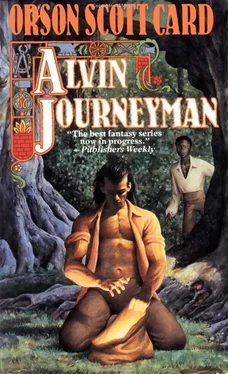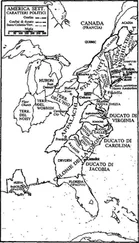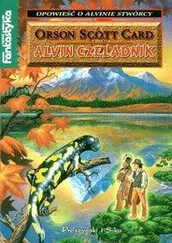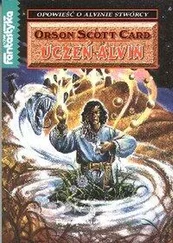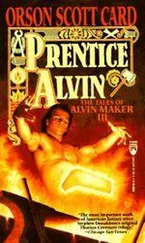Orson Card - ALVIN JOURNEYMAN
Здесь есть возможность читать онлайн «Orson Card - ALVIN JOURNEYMAN» весь текст электронной книги совершенно бесплатно (целиком полную версию без сокращений). В некоторых случаях можно слушать аудио, скачать через торрент в формате fb2 и присутствует краткое содержание. Жанр: Фантастика и фэнтези, на английском языке. Описание произведения, (предисловие) а так же отзывы посетителей доступны на портале библиотеки ЛибКат.
- Название:ALVIN JOURNEYMAN
- Автор:
- Жанр:
- Год:неизвестен
- ISBN:нет данных
- Рейтинг книги:3 / 5. Голосов: 1
-
Избранное:Добавить в избранное
- Отзывы:
-
Ваша оценка:
- 60
- 1
- 2
- 3
- 4
- 5
ALVIN JOURNEYMAN: краткое содержание, описание и аннотация
Предлагаем к чтению аннотацию, описание, краткое содержание или предисловие (зависит от того, что написал сам автор книги «ALVIN JOURNEYMAN»). Если вы не нашли необходимую информацию о книге — напишите в комментариях, мы постараемся отыскать её.
ALVIN JOURNEYMAN — читать онлайн бесплатно полную книгу (весь текст) целиком
Ниже представлен текст книги, разбитый по страницам. Система сохранения места последней прочитанной страницы, позволяет с удобством читать онлайн бесплатно книгу «ALVIN JOURNEYMAN», без необходимости каждый раз заново искать на чём Вы остановились. Поставьте закладку, и сможете в любой момент перейти на страницу, на которой закончили чтение.
Интервал:
Закладка:
But she hadn't realized until Arthur's whispered remark that of the newcomers, an unusual number had quite remarkable knacks. It wasn't that the eight witnesses were different from the rest of the town. Knacks were thick on the ground here, much more so than any other place that Peggy had visited.
Why? What brought them here?
The answer was easy and obvious—so obvious that Peggy doubted it at once. Could they really have been drawn here because Alvin was here? It was in Hatrack that the prentice learned to hone his knack until it became an all-encompassing power of powers. It was here that Alvin made the living plow. Was there something about his Making that drew them? Something that kindled a fire inside them and set their feet to wandering until they came to rest in this place, where Making was in the air?
Or was it more than that? Was there Someone perhaps guiding them, so it wasn't just the makery in Hatrack that drew them, but rather the same One who had brought Alvin to this town? Did it mean there was purpose behind it all, some master plan? Oh, Peggy longed to believe that, for it would mean she was not responsible for making things turn out all right. If God is tending to things here, then I can put away my broom and set aside my needle and thread, I have neither cleaning nor stitchery to do. I can simply be about my business.
One way or the other, though, it was plain that Hatrack River was more than just the town where Alvin happened to be in jail right now. It was a place where people of hidden powers congregated in goodly numbers. Just as Verily Cooper had crossed the sea to meet Alvin, perhaps unwittingly all these others had also crossed sea or mountains or vast reaches of prairie and forest to find the place where the Maker Made his golden plow. And now these eight had handled the plow, had seen it move, knew it was alive. What did it mean to them?
For Peggy, to wonder was to find out: She looked at their heartfires and found something startling. On past examination, none of them had shown paths in their future that were closely tied to Alvin's. But now she found that their lives were bound up in his. All of them showed many paths into the future that led to a crystal city by the banks of a river.
For the first time, the Crystal City of Alvin's vision in the tornado was showing up in someone else's future.
She almost fainted from the relief of it. It wasn't just a formless dream in Alvin's heart, with no path guiding her as to how he would get there. It could be a reality, and if it was, all of these eight souls would be a part of it.
Why? Just because they had touched the living plow? Was that what the thing was? A tool to turn people into citizens of the Crystal City?
No, not that. No, it would hardly be the free place Alvin dreamed of, if folks were forced to be citizens because of touching some powerful object. Rather the plow opened up a door in their lives so they could enter into the future they most longed for. A place, a time where their knacks could be brought to full fruition, where they could be part of something larger than any of them were capable of creating on their own.
She had to tell Alvin. Had to let him know that after all that trying in Vigor Church to teach those of feeble knack how to do what they could not really do, or not easily, here in his true birthplace his citizens were already assembling, those who had the natural gifts and inclinations that would make them co-Makers with him.
Another thought struck her, and she began to look into the heartfires of the jurors. Another group of citizens, randomly chosen—and again, while not all had spectacular knacks, they were all people whose knacks defined them, people who might well have been searching for what their gifts might mean, what they were for. People who, consciously or not, might well have found themselves gravitating toward the place where a Maker had been born. A place where iron was turned to gold, where a mixup boy had been changed so a cachet no longer named him as a slave. A place where people with knacks and talents and dreams might find purpose, might build something together, might become Makers.
Did they know how much they needed Alvin? How much their hopes and dreams depended on him? Of course not. They were jurors, trying to stay impartial. Trying to judge according to the law. And that was good. That was a kind of Making, too—keeping to the law even when it hurt your heart to do it. Maintaining good order in the community. If they showed favoritism to one person just because they admired him or needed him or liked him or even loved him, that would be the undoing of justice, and if justice were ever undone, were ever openly disdained, then that would be the end of good order. To corrupt justice was the Unmaker's trick. Verily Cooper would have to prove his case, or at least disprove Makepeace Smith's assertions; he would have to make it possible for the jury to acquit.
But if they did acquit, then the paths that opened in their heartfire were like the paths of the witnesses: They would be with Alvin one day, building great towers of shimmering crystal rising into the sky, catching light and turning it into truth the way it had happened when Tenskwa-Tawa took Alvin up into the waterspout.
Should I tell Alvin that his fellow-Makers are here around him in this courtroom? Would it help his work or make him overconfident to know?
To tell or not to tell, the endless question that Peggy wrestled with. Next to that one, Hamlet's little quandary was downright silly. Contemplations of suicide were always the Unmaker's work. But truth-telling and truth-hiding—it could go either way. The consequences were unpredictable.
Of course, for ordinary people consequences were always unpredictable. Only torches like Peggy were burdened by having such a clear idea of the possibilities. And there weren't many torches like Peggy.
Makepeace wasn't a very good witness in his own cause. Surly and nervous—not a winning combination, Verily knew. But that was why Laws and Webster had put him on first, so that his negative impression would be forgotten after the testimony of more likable—and believable—witnesses.
The best thing Verily could do, in this case, was to let Makepeace have his say—as memorably as possible, as negatively as possible. So he made no objection when Makepeace peppered his account with slurs on Alvin's character. "He was always the laziest prentice I ever had." "I never could get the boy to do nothing without standing over him and yelling in his ear." "He was a slow learner, everybody knowed that." "He ate like a pig even on days when he didn't lift a finger." The onslaught of slander was so relentless that everyone was getting uncomfortable with it—even Marty Laws, who was starting to glance at Verily to see why he wasn't raising any objections. But why should Verily object, when the jurors were shifting in their seats and looking away from Makepeace with every new attack on Alvin? They all knew these were lies. There probably wasn't a one of them that hadn't come to the smithy hoping that Alvin rather than his master would do the work. Alvin's skill was famous—Verily had learned that from overhearing casual conversation in the roadhouse at evening meals—so all Makepeace was doing was damaging his own credibility.
Poor Marty was trapped, however. He couldn't very well cut short Makepeace Smith's testimony, since it was the foundation of his whole case. So the questioning went on, and the answering, and the slander.
"He made a plow out of plain iron. I saw it, and so did Pauley Wiseman who was sheriff then, and Arthur Stuart, and the two dead Finders. It was setting on the workbench when they come by to get me to make manacles for the boy. But I wouldn't make no manacles, no sir! That's not decent work for a smith, to make the chains to take a free boy into slavery! So what do you know but Alvin himself, who said he was such a friend to Arthur Stuart, he up and says he'll make the manacles. That's the kind of boy he was and is today—no loyalty, no decency at all!"
Читать дальшеИнтервал:
Закладка:
Похожие книги на «ALVIN JOURNEYMAN»
Представляем Вашему вниманию похожие книги на «ALVIN JOURNEYMAN» списком для выбора. Мы отобрали схожую по названию и смыслу литературу в надежде предоставить читателям больше вариантов отыскать новые, интересные, ещё непрочитанные произведения.
Обсуждение, отзывы о книге «ALVIN JOURNEYMAN» и просто собственные мнения читателей. Оставьте ваши комментарии, напишите, что Вы думаете о произведении, его смысле или главных героях. Укажите что конкретно понравилось, а что нет, и почему Вы так считаете.
